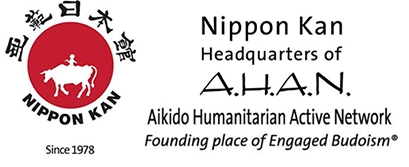Life as a Nippon Kan uchi-deshi
“So why are you here?” one of the Nippon Kan students asked me as I stood in front of the Hakama Kai class on my first day of training, still jet-lagged from the journey from Scotland, worn-out after four hours of aikido practice and slightly daunted by standing up in front of all these new people. Such a simple question, but I was stumped. ‘I wasn’t really sure,’ I answered, immediately regretting such a lame reply.
The truth was I was here to learn Aikido. I knew that. And probably everyone else knew that. But I was also here to learn something more than just wrist-pins and fancy throws. I wanted to get some kind of insight into where Aikido came from, and what this art can teach you beyond just putting your partner on the ground. I felt that Nippon Kan, with it’s combination of dojo, cultural centre, restaurant and humanitarian charity, and formed by the inspired leadership and teaching of Gaku Homma Senei, seemed like the best place for me to learn something about this very essence of Aikido.
I realized very quickly that life as an uchi-deshi is no holiday. Picture a military boot camp in 19th century Japan and you’re not far off. Every day there’s a hundred and one chores to be done, and when you’ve ticked them all off list, there’s still more to do. I was at the very bottom of the pecking order, and I could be asked to do anything, by anyone, at any time. This was hard to get used to, but once I gave in to this situation, and realized that fighting it would get me nowhere, I seemed to be able to cope with it better.
I was lucky that for the first month there was also John, my Canadian sempai, who could show me the ropes and help me avoid getting shouted at too much for messing up. Later on we were joined by a Japanese uchi-deshi who came for a month. Aside from being a great guy, Kazuyoshi proved to be very useful for translating the subtle nuances of Japanese terminology. Unfortunately Kazuyoshi broke his arm on rare day out snowboarding – at least he had a war wound to impress the ladies back home.
The Aikido practice itself was a little different to my own club’s back in Scotland. Nippon Kan prides itself on being traditional, and true to the roots of aikido, which while a bit strange at first, I have really grown to admire. The attitudes of the students and teachers are always noticeably keen and positive, and I hope to bring back some of this spirit back to Scotland with me. It’s difficult to really gauge what kind of an impact three months of intense training has had on my practice. As ever with Aikido training, there are times when I think I’m actually getting somewhere, and others where I feel I’ve gone backwards. I’m certainly a lot fitter (though things still hurt), but I don’t think I’ll really fully appreciate any changes until a few weeks after. We’ll see.
Aside from the Aikido practice, I feel I’ve learned a great deal in lots of different areas. I can take now take computers apart and put them back together, from my time preparing shipments for AHAN’s overseas projects. I now pride myself as a super cleaner, and dishwasher from my time at Domo, Homma Sensei’s restaurant – my girlfriend is particularly pleased to hear this and hopes it lasts. And I’ve also learned about gardening, built a bird cage for resident doves (who promptly laid eggs on Easter day not long after the creation of their love nest), raised the roof of a Mongolian Ger and beaten the local karate club at the American version of skittles. Life here has definitely been interesting and varied.
I know I will look back on my time at Nippon Kan fondly. But it’s been tough though, make no mistake. When you’re physically tired from practice, you’ve got a Masters thesis due in, there’s still fifty things to do by tomorrow, and nothing you do is ever quite right, it can be a struggle to keep your head above water and go about your business with a smile. But somehow if it was too easy, it don’t think I would appreciate it as much. This small Aikido box, in which I have spent so much of my life in the last few months has really taught me what I came here to learn (but never actually told people on my first nerve-wracking day here). Nippon Kan has shown me something of the essence of Aikido, both on and off the mat, and I have to thank the students here, Domo staff, the instructors, and ultimately Homma Sensei for this valuable experience. It’s an experience I’m sure will continue to benefit me for the rest of my life.
Jim Wolff
January – April 2007

